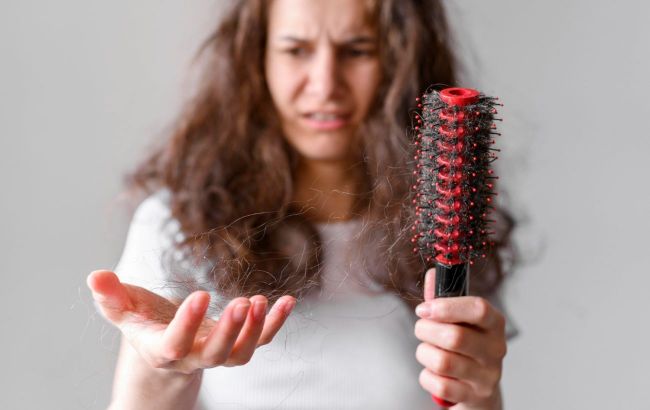Hair loss despite supplements - 14 hidden factors might be to blame
 Unexpected causes of hair loss are revealed (photo: Freepik)
Unexpected causes of hair loss are revealed (photo: Freepik)
Taking vitamins is an important step in the fight against hair loss, but sometimes it's not enough. Often, hair continues to fall out even if you follow a healthy diet and take supplements.
RBC-Ukraine reports on the main factors that can affect hair health.
Causes of hair loss
Trichologist Yulia Dudiy said that often, after taking the necessary tests and vitamins, hair still continues to fall out. This can occur for the following reasons:
- Abuse of vitamin A - an excess in the body can cause hair loss because it affects the growth cycle
- Frequent wearing of hats - constant pressure and insufficient ventilation can lead to weakening of hair follicles
- The habit of sleeping with wet hair - high humidity creates ideal conditions for the development of fungi that can cause hair loss
- Frequent use of dry shampoo - the product accumulates on the scalp, clogging pores and disrupting the nutrition of the follicles
- Exposure to blue light from gadgets - studies show that it can affect hormonal balance, in particular melatonin levels, which are important for hair growth
- Lack of healthy fats - low-carb and fat-free diets can lead to hair loss due to a lack of omega-3 and other healthy fatty acids
- Tight hairstyles - ponytails or dreadlocks can cause traction alopecia, which leads to weakening of hair follicles
- Allergies to shampoo or conditioner - some ingredients, dyes or preservatives can cause allergic reactions accompanied by hair loss
- Intestinal diseases - impaired absorption of nutrients due to problems with the microflora (for example, irritable bowel syndrome) can lead to vitamin deficiency and hair loss
- Improper shampooing - infrequent shampooing can cause sebum accumulation and clogging of follicles, and too frequent shampooing can dry out the scalp and make hair brittle
- Excessive physical activity can cause stress in the body and provoke hair loss
- Polycystic ovary syndrome (PCOS) causes hormonal imbalance, which can lead to male pattern hair loss
- Insufficient water intake - dehydration of the body impairs blood circulation in the scalp, which weakens hair follicles
- Chronic sleep deprivation - lack of sleep leads to an imbalance of hormones, which slows down hair growth and promotes hair loss.
How to take care of your hair properly
Hair care depends on its type, but there are universal rules that will help make it healthy and strong.
Cleansing
Wash your hair 2-3 times a week to avoid drying out your scalp. Use a sulfate- and paraben-free shampoo that is suitable for your hair type.
Do not apply shampoo to the entire length - it is enough to rinse the roots well, and the foam will cleanse the rest of the hair.
Moisturize and nourish
After each wash, use a conditioner to close the hair scales and make it smooth. Once a week, do deep moisturizing with masks (with keratin, argan oil, panthenol).
Use indelible care products (serums, oils) for the ends of the hair.
Minimize damage
Avoid hot water - it dries out the hair, so it is better to wash it with warm or cool water. Comb wet hair gently using wide-toothed combs or soft-bristled brushes.
Dry your hair naturally; if you use a hair dryer, set it to a medium to cool temperature. Minimize the use of curling irons, flat irons and hairsprays.
Protection.
Wear a hat in winter and protect your hair from the sun in summer (SPF sprays, hats). Use silk or satin pillowcases to reduce hair breakage.
You may also be interested in:
- Six safe ways to dry your hair safely at home
- 5 main mistakes people often make when dyeing their hair.
Sources: Trichologist Yulia Dudiy's Instagram page and WebMD.
This material is for informational purposes only and should not be used for medical diagnosis or self-treatment. Our goal is to provide readers with accurate information about symptoms, causes, and methods of detecting diseases. RBС-Ukraine is not responsible for any diagnoses that readers may make based on materials from the resource. We do not recommend self-treatment and advise consulting a doctor in case of any health concerns.

